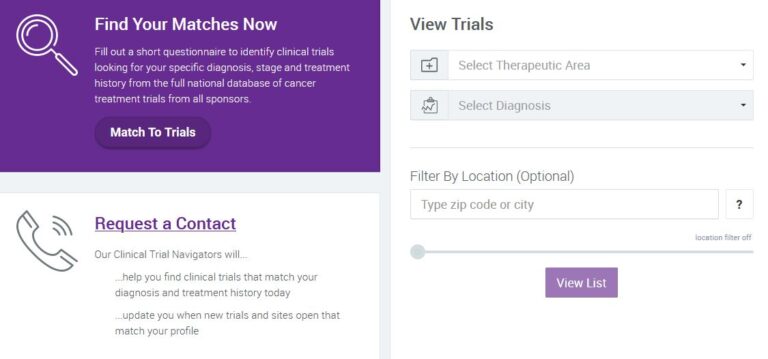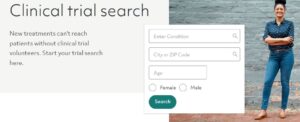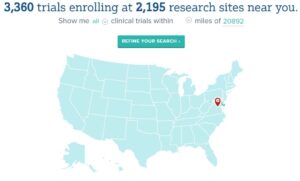Prostate cancer clinical trials
Men saved by prostate cancer clinical trials
"It worked for me...Think of your family and think about paying it forward.”

U.S. Army Col. (ret.) Gary Steele was diagnosed with prostate cancer in 2011. After a series of treatments that failed to halt his prostate cancer, Col. Steele and his wife, Mona, traveled to the Johns Hopkins Sidney Kimmel Comprehensive Cancer Center for a second opinion where his medical team suggested a clinical trial.
“I had them explain to me what a clinical trial was because I didn’t know. I was not educated at all on this stuff,” recalled Col. Steele. After talking through their options, Col. Steele says he and his wife decided to participate in the trial.
“We have two sons and I thought that if I end up being okay with this clinical trial, then I could be helping my sons,” he said.
Col. Steele says he has been clean and clear of prostate cancer since late 2015 and credits his ongoing participation in the clinical trial for his success.
“It worked for me. I can only say educate yourself, take care of yourself. Think of your family and think about paying it forward.”
A 4-minute video from the American Association for Cancer Research.
“The clinical trial beat my cancer, and it also offered me a great opportunity to impact medical research."

After being diagnosed with early-stage prostate cancer, Junius Hayes was offered an opportunity to participate in a clinical trial. The study would test a biodegradable balloon that, when inflated, would allow for more targeted radiation treatment of prostate cancer with less damage to the healthy areas surrounding the prostate.
“When the medical team told me the science behind the trial, I had to chuckle. I knew all about the materials being used in it because I helped develop them for different applications,” said Hayes. That was during his work at the National Aeronautics and Space Administration (NASA).
Hayes agreed to participate in the trial, which successfully treated his cancer. After eight weeks of radiation, he received a clean bill of health.
“The clinical trial beat my cancer, and it also offered me a great opportunity to impact medical research,” said Hayes. “If I’m able to help advance science in any way, then I’m thrilled to have participated.”
Source: “African-American Cancer Patient Participates in Pioneering Clinical Trial.”
What are clinical trials and why join one?
Cancer clinical trials allow researchers to study innovative and potentially life-saving new treatments. The goal is to find treatments that are better than what’s currently available.
Placebos are rarely used in cancer treatment clinical trials. If participants don’t receive the study medication, they are always given the best available treatment for their particular cancer. This helps the researchers determine whether the study medication is better than the standard treatment.
A 2-minute video from Stand Up to Cancer
Reason one. You have a chance to receive treatment based on the latest research that is not yet available to others. Clinical trials are based on the best knowledge available for your kind of cancer.
Reason two. You’ll get high-quality care and be carefully monitored throughout the study.
Reason three. You add to the world’s knowledge about cancer and help to improve cancer care for future generations.
A 2-minute video from the National Cancer Institute

“There are some well founded reasons why there is mistrust in research because of well documented historical abuses,” says Lannis Hall, M.D.
“I have told patients for years, if they want to ensure the absolute best care, then they want to request participation on a clinical study. It is because the safeguards in clinical trials are multilayered.”
“Clinical trials test new drugs or new regimens or different ways of treating cancer against the current standard to see if the new interventions would be better than what we currently have,” says Foluso Bisi Ademuyiwa, M.D.
A 5-minute promotional video for the Siteman Cancer Center in St. Louis, one of 71 National Cancer Institute-Designated Cancer Centers in the United States.

“We know that patients who are enrolled on studies today typically have a better outcome than those who are not enrolled in studies. They’re going to be getting nothing less than the standard of care,” says Jeff Michalski, M.D.
“And often the oversight and quality assurance that goes along with that leads to a better outcome.”
Every FDA-approved prostate cancer drug was tested in clinical trials
To look for better ways to care for people with prostate cancer, doctors create research studies involving volunteers, called clinical trials. Every FDA-approved drug was tested in clinical trials.
Clinical trials are used for all types and stages of prostate cancer. Many focus on new treatments to learn if a new treatment is safe, effective, and possibly better than the existing treatments. These types of studies evaluate new drugs, different combinations of treatments, new approaches to radiation therapy or surgery, and new methods of treatment.
Some clinical trials study new ways to relieve symptoms and side effects during treatment. Others study ways to manage the late effects that may happen a long time after treatment.
People who participate in clinical trials can be some of the first to get a treatment many years before it is available to the public.
Source: Prostate Cancer: About Clinical Trials (American Society of Clinical Oncology, 2021)
"We don't extend lives without research"
 “We don’t make advances, we don’t extend lives without participating in research,” says Andrew Armstrong, M.D., a prostate surgeon at Duke University. “We’re not happy with the way things are. We want them to be better and the only way to make them better is by studying them.”
“We don’t make advances, we don’t extend lives without participating in research,” says Andrew Armstrong, M.D., a prostate surgeon at Duke University. “We’re not happy with the way things are. We want them to be better and the only way to make them better is by studying them.”
Not all of these trials are successful, unfortunately. But many are and that’s why we are seeing men live longer and have better survivorship nowadays.”
Armstrong looks for biomarkers that will identify patients with prostate cancer who are at higher risk for a more aggressive clinical progression of the disease.
Source: Should Prostate Cancer Patients Consider a Treatment in Clinical Trials? (video, 2021)
Lack of diversity in prostate cancer clinical trials
White men have dominated prostate cancer clinical trials

W=White 83.4%, B=Black 6.7%, A=Asian 3.3%,
H=Hispanic 0.9%, American Indian/Alaska Native 0.6%
Source: “Diversity of Enrollment in Prostate Cancer Clinical Trials: Current Status and Future Directions” (2020)
Black and Hispanic men under-represented in cutting-edge prostate cancer clinical trials
Precision oncology clinical trials test potential treatments targeted to specific genetic mutations that may be driving tumor growth. In this study of 15 prostate cancer trials that were conducted between 2004 and 2017, researchers calculated for racial/ethnic groups the ratio of their participation in the trials to their prevalence of prostate cancer in the population.
 Black representation in the trials was 42 percent lower and Hispanic representation 67 per cent lower than their share of prostate cancer in the U.S. population. On the other hand, White representation was 40 percent higher and Asian representation 45 percent higher than it should have been if it had matched their share of prostate cancer.
Black representation in the trials was 42 percent lower and Hispanic representation 67 per cent lower than their share of prostate cancer in the U.S. population. On the other hand, White representation was 40 percent higher and Asian representation 45 percent higher than it should have been if it had matched their share of prostate cancer.
“Current personalized treatments that are broadly generalized to all individuals based on the presence or absence of a biomarker without fully studying the implications of such treatment in racial and ethnic minority populations may not be appropriate,” Sophia C Kamran, M.D., (left) of the Massachusetts General Hospital and her colleagues wrote.
Source: “Racial and Ethnic Disparities Among Participants in Precision Oncology Clinical Studies” (2021).
Why diversity is so important in cancer clinical trials
How else will we know that a new treatment works as well for all races, ethnicities, ages and genders?

Clinical trials provide individuals with cancer the opportunity to participate in groundbreaking research that may bring about new treatments that improve quality of life, extend survival, and even prove lifesaving. Research and results that come from clinical trials also shed light on the side effects that participants experience during the study.
If people from all groups are not represented in clinical trials, we will not know if a new cancer treatment works as well for all ages, genders, races, and ethnic groups. We also will not know if some groups are more likely than other groups to develop side effects.
If all groups are not represented in clinical trials, they will not have the chance to benefit equally from the newest treatments. This can widen the differences we see in cancer outcomes in the U.S.
Source: “The Importance of Diversity in Clinical Trials,” an 8-page brochure from The Cancer Support Community (2021)
Critical information is gained only by participating in clinical trials
“I always try to explain to my patients the importance for minorities to participate in the clinical trials so that we’re represented in data analysis,” says Patricia Robinson, M.D., a cancer physician-researcher and Associate Dean in the Stritch School of Medicine at Loyola University, Maywood, Illinois.
“We don’t all metabolize drugs the same way and I think it’s important for people to recognize, within their patient population based upon genetics, what the potential benefit may be as well as the potential toxicities. If you are a slow metabolizer or quick metabolizer, that information is only gained by participating in clinical trials and having the data analyzed.”
A 2-minute video from the Cancer Support Community.
Considering a prostate cancer clinical trial

Page 1 of “Clinical Trial Options For Men With Prostate Cancer,” a 12-page brochure from Zero, the end of prostate cancer and Clovis Oncology, a pharmaceutical company
Clinical trial options for men with prostate cancer

A 12-page brochure addressing the questions: Is a Clinical Trial
Right for You? What’s Meant by Clinical Trial Phases? What Should You Consider Before Joining a Clinical Trial? A Checklist of Questions to Ask.
What Terms Might You Encounter? And some sources of support for prostate cancer patients.
Free download of Clinical Trial Options
From Zero, the End of Prostate Cancer with support from Clovis Oncology, a U.S. pharmaceutical company that develops cancer treatments.
Information about clinical trial participation for people of color
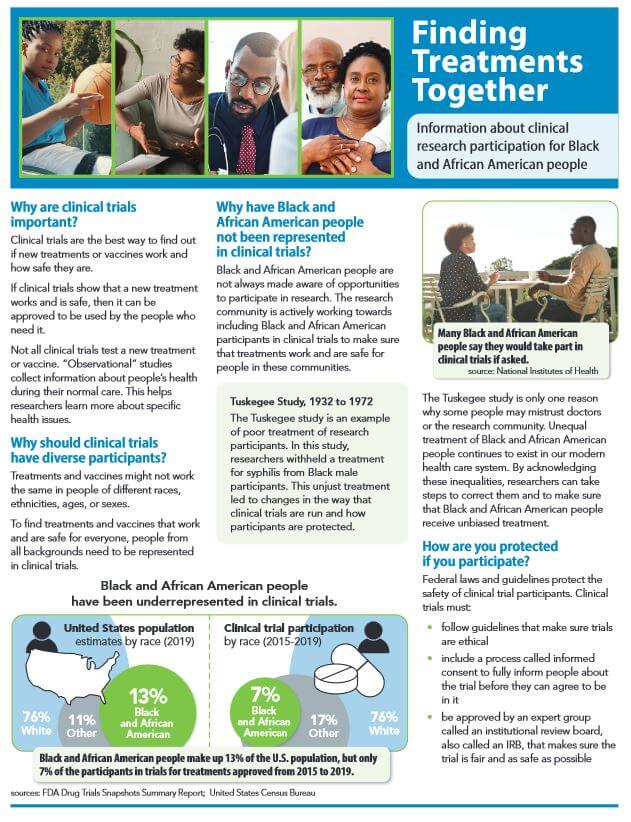
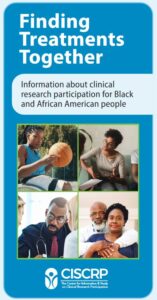
Source: Center for Information and Study on Clinical Research Participation, Inc.(CISCRP), a non-profit 501(c)(3) organization advocating for clinical research education.
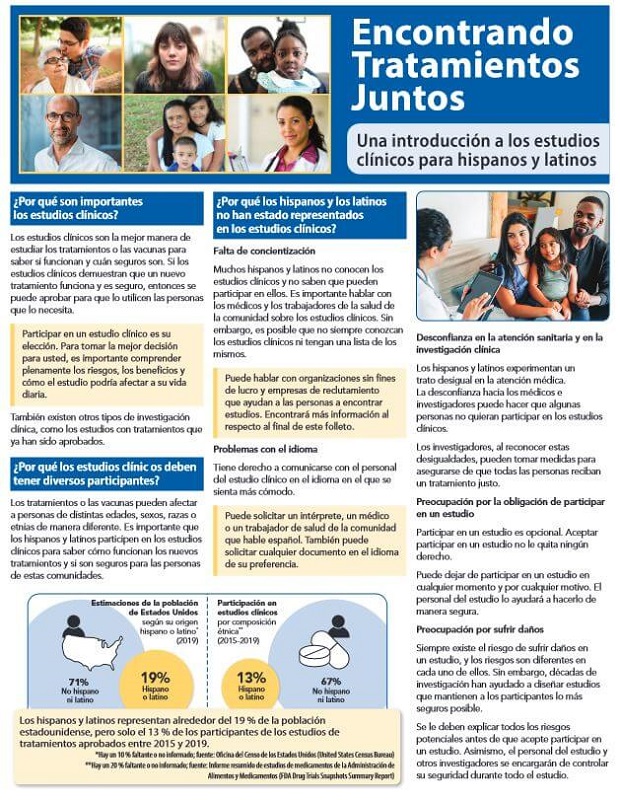
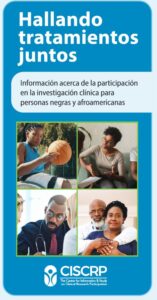
Source: Center for Information and Study on Clinical Research Participation, Inc.(CISCRP), a non-profit 501(c)(3) organization advocating for clinical research education.
Free phone service helping African American cancer patients learn more about clinical trials

A free, over-the-phone service that helps Black or African American (AA) cancer patients learn more about clinical trials.
The Peer Clinical Trials Support Program matches interested patients with a peer — a Black or African American cancer patient or survivor with experience participating in a cancer clinical trial. Patients have the opportunity to discuss their fears, questions, and concerns with a knowledgeable and empathetic guide, and hear from someone of a similar background who has “been there, done that.”
Source: Cancer Support Community
Questions to ask before joining a clinical trial
National Cancer Institute
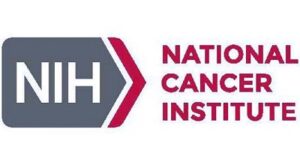
If you are thinking about taking part in a clinical trial, be sure to ask your doctor, “Is there a clinical trial that I can join?” If your doctor offers you a trial, here are some questions you may want to ask, such as:
How long will I be in the trial?
What kinds of tests and treatments are involved?
How will the doctor know if the treatment is working?
How will I be told about the trial’s results?
How long do I have to make up my mind about joining this trial?
Who can I speak with about questions I have during and after the trial?
Who will be in charge of my care?
Is there someone I can talk to who has been in the trial?
More at: “Questions to Ask Your Doctor about Treatment Clinical Trials” (National Cancer Institute)
American Cancer Society

- What phase is this clinical trial in?
- Why is this study being done?
- How long do I have to make this decision?
- What’s likely to happen if I decide to take part or not take part in the clinical trial?
- Will the researchers work with my cancer doctor? Who will be in charge of my care?
- Who will I get in touch with if I have problems, questions, or concerns?
- What are my other options (standard treatments, other clinical trials)? What are the pros and cons of each?
- How much do you know about this treatment? About clinical trials in general?
- What were the results in past studies of this treatment? How likely are they to apply to me?
- Is there anything else I can read about this clinical trial?
- What kinds of treatments and tests would I need to have? How often are they done?
- Would I need to plan on extra time or travel?
And more questions at “Deciding Whether to Be Part of a Clinical Trial” by the American Cancer Society (2022)
What are the alternatives if I don't join a clinical trial?
“Number one is what are the alternatives that I would have if I did not participate in the clinical trial? What are the standard of care therapies? Prostate cancer now has a vast menu. Many patients don’t necessarily even hear that,” says prostate cancer surgeon Andrew Armstrong, M.D., at the Duke University Cancer Center,
“It’s important to ask about risks. What have other patients experienced going into that study? What’s the evidence that it has helped people before? Why is this so promising?
Then, if you’re hearing about a trial and you’re making a decision to travel, sometimes asking questions about whether the trial will cover your lodging or transportation, gas, money, lodge, airport travel. Some trials do do that.”
A 2-minute video from the Patient Empowerment Network.
Finding a prostate cancer clinical trial
Steps to Find a Clinical Trial
Learn how to find the right clinical trial for you with the National Cancer Institute’s six-step guide:
Step 1: Gather Details about Your Cancer
Step 2: Find Clinical Trials
Step 3: Take a Closer Look at the Trials that Interest You
Step 4: Contact the Team Running the Trial
Step 5: Ask Questions
Step 6: Make an Appointment
A 2-minute video from the National Cancer Institute
"Should consider a clinical trial almost everytime a clinical decision is being made"
“I think sometimes there’s this misconception that clinical trials should only be utilized when there aren’t any other options,” says Rana R. McKay, M.D.
“Where in fact, I would say clinical trials should be an option to discuss every single time a treatment is being changed, because ultimately the goal is to make sure patients are living longer and living better. And making sure that clinical trials are an option on the table at every juncture is really a key step in that.”
McKay leads a prostate cancer clinic treating men diagnosed with aggressive prostate cancer and teaches at the University of California San Diego School of Medicine.
A 3-minute video from the Patient Empowerment Network.
"Easiest way to learn about clinical trials is from your physician"
“The easiest way to learn about clinical trials is to start start by asking the physician that’s treating you for your prostate cancer,” says prostate surgeon Yaw Nyame, M.D. “Oftentimes they’ll have resources and connections to the trials directly or the people who are administering them.”
“Other great sources are going to be patient advocacy networks. There are many of them for prostate cancer. These are great sources of finding out what clinical trials exist.”
Nyame treats kidney, prostate, bladder and testicular cancers at the Fred Hutchinson Cancer Center and teaches at the University of Washington School of Medicine.
“The trick is navigating all the information and knowing what trials are available for you, whether you qualify and that kind of thing can be difficult.”
A 4-minute video from the Patient Empowerment Network.
Finding a prostate cancer clinical trial
Zero

Get matched to a prostate cancer clinical trial that’s right for you! Print out your results to discuss with your treatment team, or contact the study coordinators directly. Patients are matched to clinical trials by Antidote, a U.S. and U.K. firm that recruits volunteers for clinical trials.
Go to “Find a clinical trial” at Zero, the end of prostate cancer.
Help finding prostate clinical trials from government agencies
clinicaltrials.gov from the National Library of Medicine
ClinicalTrials.gov is a database of privately and publicly funded clinical studies conducted in all 50 states and in 221 countries.
The website provides current information about clinical research studies for patients, their families and caregivers, health care professionals, and the public.
Each study record includes a summary of the study protocol, including the purpose, recruitment status, and eligibility criteria. Study locations and specific contact information are listed to assist with enrollment.
Information on ClinicalTrials.gov is provided and updated by the organizations and people that sponsor and carry out the studies. Listing a study does not mean it has been evaluated by the U.S. Federal Government.
Clinicaltrials.gov is a free service of the National Institutes of Health (NIH) and is maintained by the National Library of Medicine (NLM).
For more information about using the database, visit clinicaltrials.gov
National Cancer Institute

“If you decide to look for trials on your own, learn how to find the right clinical trial for you with the National Cancer Institute’s six-step guide:
- Step 1: Gather details about your cancer
- Step 2: Find clinical trials
- Step 3: Take a closer look at the trials that interest you
- Step 4: Contact the team running the trial
- Step 5: Ask questions
- Step 6: Make an appointment
The NCI’s Cancer Information Service can also provide a tailored clinical trials search that you can discuss with your doctor. To reach them call 1-800-4-CANCER (1-800-422-6237) and select option 2. This is a free service. Keep in mind that the search results do not replace advice from your doctor.
Source: National Cancer Institute (2022)
Help from non-profit 501(c)3 charitable organizations
Cancer Research Institute's Clinical Trial Finder
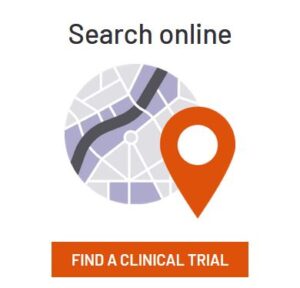
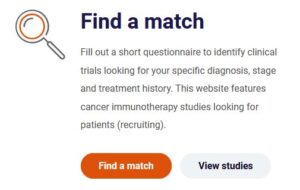

Our Cancer Immunotherapy Clinical Trial Finder will aid you in finding your answer to cancer. Understand the basics of cancer clinical trials, why clinical trials are so critical to our work, what things to consider about enrolling, and how to assist patients in finding clinical trials for which they may be eligible.
Source: Cancer Research Institute, a 501(c)3 charitable organization.
Standup to Cancer

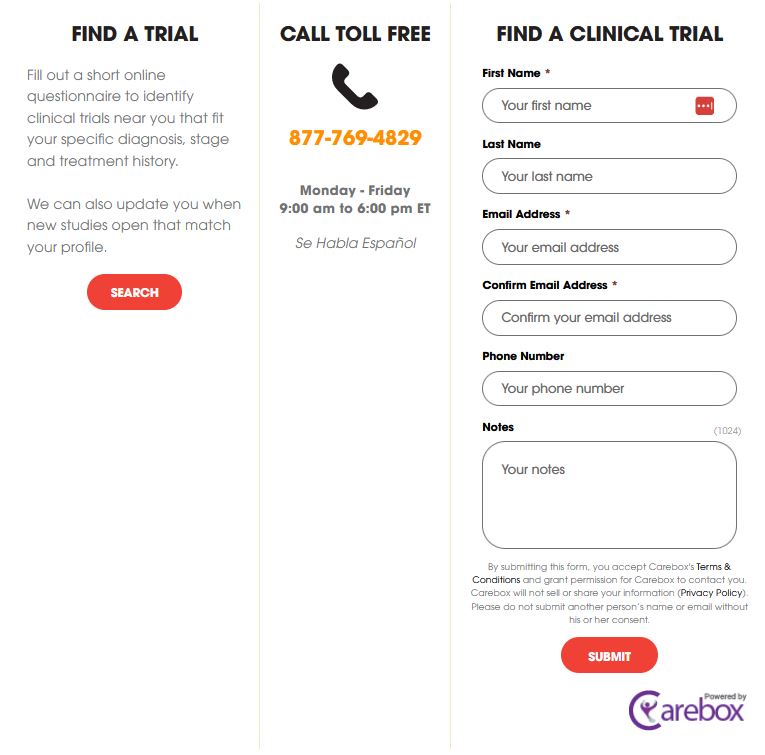
Source: Stand up to Cancer, a division of the Entertainment Industry Foundation (EIF), a 501(c)(3) charitable organization.
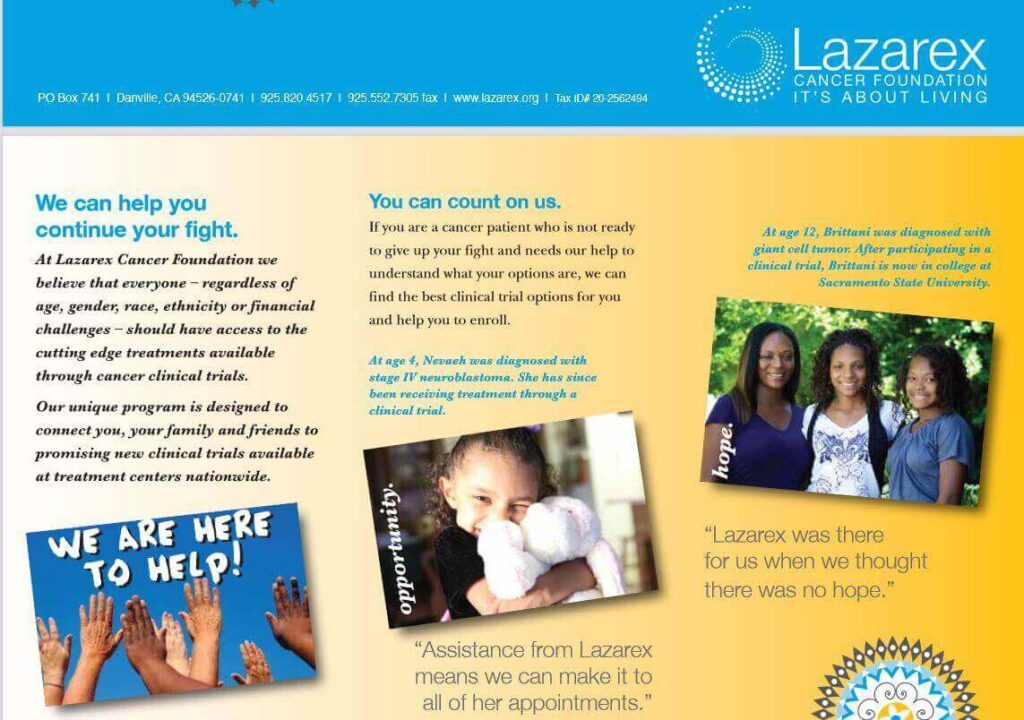
If you are a cancer patient who needs help identifying clinical trial options or needs financial assistance to attend a clinical trial, we’d like to hear from you. Our Patient Navigator can help you find the right clinical trial. We can also help you with the costs associated with participating in a clinical trial, including transportation and lodging.
For more information, email Lazarex or to speak with a Lazarex representative, call 925.820.4517.
Source: Lazarex Cancer Foundation, a 501(c)3 charitable organization.


Finding the right trial can be overwhelming. Search Clinical Trials is a free service designed to help people find clinical trials that are relevant to their medical and healthcare needs.
The CISCRP team will work with you to understand your options and help you find local clinical trials in your community, or as far as you would be comfortable traveling.
Source: Center for Information and Study on Clinical Research Participation, Inc.(CISCRP), a non-profit 501(c)(3) organization advocating for clinical research education.
Help from private companies
EmergingMed
For over a decade, EmergingMed’s clinical navigators have facilitated clinical trial searches for nearly 500,000 patients. Request a Contact today to learn how we are able to help.
Source: EmergingMed
Antidote

“As a digital patient engagement company, Antidote’s focus is on connecting patients to clinical trials — that’s why we have a moral imperative to support diversity, equity, and inclusion (DEI) initiatives that ensure clinical trial populations reflect those of the real world.”
Source: Antidote
Clinical Trials GPS
“Our site has a comprehensive listing of all trials in the United States and is categorized to help you find it quick. ClinicalTrialsGPS has information on trials from all the leading pharmaceutical companies, academic institutions and trials ranging from Cancer to Diabetes and Vaccines to Osteoarthritis.”
“Our goal is to provide you with the most comprehensive, up to date information about ongoing clinical studies as well as a quick and easy way to participate. “
Source: Clinical Trials GPS
CenterWatch
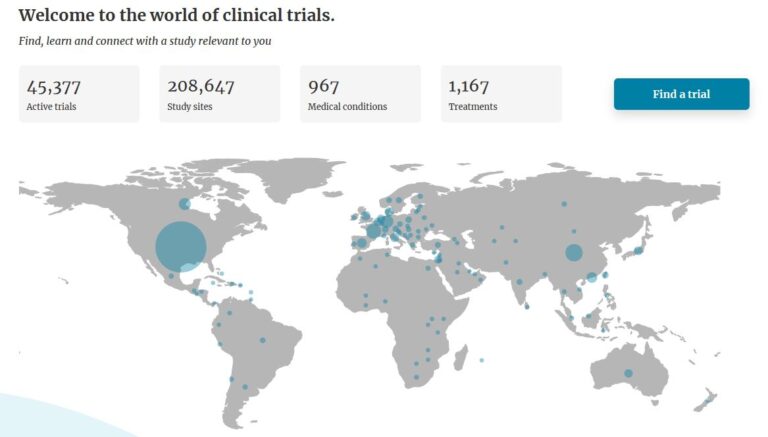
Search and browse to find a trial relevant to you. Read the trial details on eligibility, location and participation. You can also register to be notified when a trial you’re searching for begins. Find a trial near you.
Source: Center Watch


